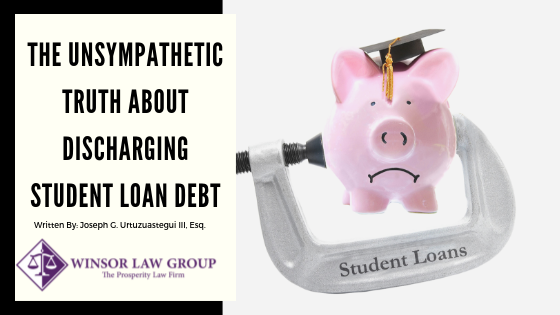
The Unsympathetic Truth about Discharging Student Loan Debt
- June 5, 2019
- Kristine Beaver
- Comments Off on The Unsympathetic Truth about Discharging Student Loan Debt
By: Joseph G. Urtuzuastegui III
Disclaimer: This article is informational only and is not intended to give any legal advice. If you have questions about filing bankruptcy and whether it is right for you contact Winsor Law Group for a consultation.
Higher education has become a necessity in our country to secure employment and prosper as an individual or family. Ironically, the student loan debt we rack up in the process hinders our ability to prosper with monthly payments that, in some cases, are more than a mortgage on a house (speaking from experience). The average student loan debt for a college graduate is about $30,000.00 and that average is nearly doubled if you decide to stick it out longer and obtain a graduate degree. It is no wonder that student loan debt is a problem that many Americans face today, but what can be done to ease the burden of repayment?
In practicing bankruptcy, I often get the question whether student loan debt can be discharged through a chapter 7 bankruptcy. The easy answer would be to just say “no”, but that is not entirely true because in very rare circumstances a bankruptcy judge will allow the discharge of student loans. Warning: If you are reading this thinking I am about to give you hope you will most likely be disappointed! To discharge student loans, courts have used a three factor “undue hardship” test, called the Brunner test. When attempting to meet the Brunner test, a student loan debtor must show: (a) they wouldn’t be able to maintain a basic standard of living if they had to pay back the student loans; (b) the hardship will last for a large percentage of repayment; and (c) the student loan debtor has honestly tried to repay the student loan until this point. While the Brunner test seems like a simple hill to get over, in practice it is more like climbing Everest. As Leslie H. Tayne, Esq. of Tayne Law Group, P.C. explains:
The reality is that unless you can show an extreme hardship where you will never work again and have attempted to pay back the loans and cannot, the likelihood is that bankruptcy won’t be an option.
In other words, if the student loan debtor is ever be able to earn a living at any point in your lifetime then the student loan most likely will not be dischargeable in a bankruptcy. On the other hand, assuming that you have climbed Everest and proved undue hardship under Brunner, the entire student loan debt still might not be fully discharged. The court could, and most likely would, exercise their option to partially discharge the student loan or restructure the loan with new repayment terms. Therefore, attempting to discharge student loan debt through a bankruptcy most likely will not be the best route for the majority of people drowning in student loans.
However, there are a few things that student loan debtors may be able to do to ease their burden:
First, federal student loans and some private student loans may offer different options to lower your monthly payments. An income-based repayment plan to pay back student loan is very useful and available to many people who apply. It works by taking into account the debtor’s current income and other personal circumstances, i.e. family size, house payments, etc., and calculating an amount that the debtor can afford. This option must be updated on a yearly basis, but it is a great alternative from making payments that may put you in the red.
Second, if times are very hard, but there is still hope on the horizon for the debtor to pull themself out of it within a six-month period, a student loan debtor can apply to their student loan servicer for a deferment or forbearance. A deferment or forbearance allows a debtor to forego payments for a short period of time where making the payments would be virtually impossible. Keep in mind, although payment is not required during the deferment or forbearance period, interest will still accrue on the student loan.
Third, a debtor could work in public service or a non-profit organization to qualify for Public Service Loan Forgiveness (PSLF). To be eligible, a student loan debtor must work full-time for a government or non-profit organization AND must have made 120 loan payments under a PSLF qualified repayment plan. For more information on how to qualify for PSLF click on the link above.
One of the most important things a student loan debtor can do to ease their burden and help them and their family prosper is to be informed of the different options available to assist in repaying, discharging, or forgiving student loan debt. Navigating your debt may be tricky, which is why it is vital to have a knowledgeable team in your corner. At Winsor Law Group we are dedicated to assisting you and your family prosper.
Winsor Law Group is a Debt Relief Agency. We help people file for relief under the Bankruptcy Code.
*The information provided in this article is of a general nature and reflects only the opinion of the author at the time it was drafted. It is not intended as definitive legal advice, does not create an attorney-client relationship, and you should not act upon it without seeking independent legal counsel.
